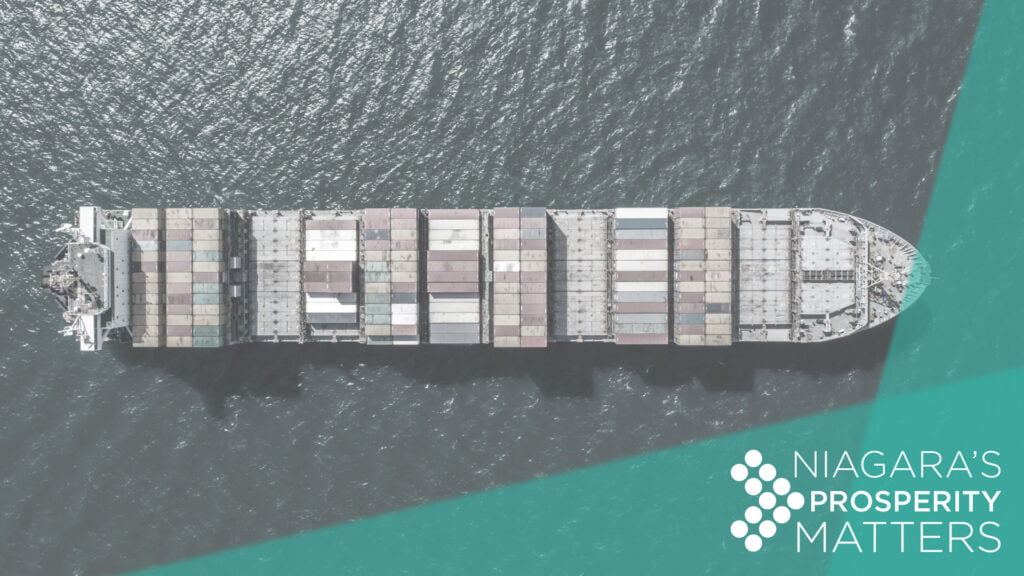Niagara’s Prosperity Matters

When this election takes place, a year and a half will have passed since the COVID-19 pandemic came to Canada. Many businesses have suffered tremendously under both the pandemic and the necessary social and economic restrictions that came with it, but now we can realistically look towards our recovery and regrowth. The next Government of Canada will have the task of stewarding the economy out of the pandemic and back into sustainable, equitable growth.
The pandemic has highlighted how important the federal government is, especially during a crisis. The role of the government in safeguarding the private sector during the pandemic cannot be overstated. Many businesses have told us that they have only survived because of government programs. Now, we ask how that role could also be utilized for growth.
Business plays a vital role in building and sustaining Niagara. A bold plan is needed to create prosperity in our community and an environment that fosters sustainable economic growth, entrepreneurship, and good jobs for people.
The GNCC is a non-partisan organization and will remain so throughout this election, as it always has. Canadians will decide which party offers a plan that allows our country to recover, and to grow. Our plan is broken into two aspects: firstly, getting everyone over the COVID finish line; secondly, growing our economy for the future.
We believe that a prosperous economy will allow us to reach other goals like improved childcare, climate targets, equity, reconciliation and more. It is in that spirit that we offer these policy suggestions to all candidates and parties.
We hope that they will help you.
Mishka Balsom
CEO, Greater Niagara Chamber of Commerce
 Part One: Getting Everyone Over the COVID Finish Line
Part One: Getting Everyone Over the COVID Finish Line
Many small enterprises and businesses in the hardest-hit sectors, including tourism, travel and hospitality, will not recover until public health restrictions are lifted and economic activity returns to normal. Until that time comes, these fellow Canadians require ongoing support.
- Create a replacement program for the Canada Emergency Wage Subsidy (CEWS) and the Canada Emergency Rent Subsidy (CERS). This should be exclusively available for businesses that are still hurt by pandemic-related public health restrictions. This program should cover the period from October 2021 until spring 2022. The revamped version must retain at least the 75% (CEWS) and 65% (CERS) subsidy rates, in line with what businesses in other sectors had access to until they were permitted to recover.
- Introduce debt relief by forgiving interest payments and delaying repayment on COVID-related government backed loans for SMEs in the hardest-hit sectors. Businesses still suffering revenue loss from the pandemic, such as those in Niagara’s prominent hospitality sector, should have their grace periods extended and additional portions of their credit forgiven. This measure should apply to the Canada Emergency Business Account (CEBA), the Business Credit Availability Program (BCAP) and the Highly Affected Sectors Credit Availability Program (HASCAP).
- Return to pre-pandemic deficit-to-GDP ratio levels by the end of the business cycle. Ensure GDP growth exceeds pre-pandemic levels by a substantial margin and public spending is focused on generating economic growth. While we hope that the pandemic is a once-in-a-lifetime crisis, the additional debt incurred should be paid down before the end of the business cycle.
 Part Two: Growing a Prosperous Economy
Part Two: Growing a Prosperous Economy
Nurture Canadian SMEs
Canadians are hardworking and innovative, so it is no surprise SMEs are Canada’s biggest employers. The next Parliament must ensure an environment that helps Canada’s entrepreneurs grow and create jobs.
- Increase the revenue threshold for GST/HST registration. Increasing the threshold will support small business creation and promote the commercialization of existing Canadian innovation.
- Modernize the tax system so it works for SMEs. Form a Government of Canada Tax Working Group to further simplify Canada’s tax system, particularly for small businesses.
- Modernize the social safety net to support entrepreneurs. The pandemic illustrated how little coverage that relief programs offered to solopreneurs and small- and micro-business owners. Niagara’s small and seasonal businesses were particularly affected. A comprehensive support system that supports entrepreneurs would encourage the founding of new businesses and economic growth.
- Develop a Small Business Net-Zero Strategy. This strategy will provide Main Street SMEs with incentives and opportunities to participate in Canada’s plan to achieve net-zero emissions.
- Continue facilitating the secure digitalization of SMEs. The government can enhance growth by making cybersecurity part of the recently launched Canada Digital Adoption Program and by championing the development of cybersecurity standards across the country.
- Champion local products. The pandemic has highlighted both the need to support local businesses in the face of global competition and the advantages of shortened supply chains when goods are in high international demand. The government should work to promote and support locally-produced goods across a broad range of Canadian industries.
Build infrastructure that supports commerce
Businesses will only reach new customers if they can get their products to market. Getting there requires high-quality infrastructure with sufficient capacity to carry goods across different modes of transportation.
- Finance the National Trade Corridors Fund with $5 billion per year in total. This measure will enable more provinces, territories and municipalities to receive infrastructure funding to move goods domestically and abroad.
- Maximize the economic benefit of the seaway by developing adjacent lands. The Seaway has enormous unrealized economic potential for Niagara. Potential industrial lands adjoining the seaway should be developed. This may require the separation of the lands from seaway management.
- Support agriculture with infrastructure. Niagara’s farmers are facing new challenges from climate change, with weather patterns becoming more unpredictable. Investments in, for example, irrigation infrastructure would both better support Niagara’s agricultural industry and encourage further investment in farming arable land.
Build a modern economy
The post-COVID economy will need to be more flexible and responsive, with better data and support for resilient and non-traditional business models.
- Provide world-class data. Statistics Canada should be transformed into an arm’s-length organization, like Elections Canada, and fully funded to provide economic and social data that is the equal of that offered in Europe and the United States.
- Undertake a comprehensive and independent tax system review. The Canadian tax code has been patched and amended for half a century. A comprehensive reform and simplification will ensure our country remains globally competitive and attractive for investment given the upcoming global tax regime changes being discussed at the OECD.
- Make Canadian trade and import regimes competitive. Canadian border communities such as Niagara would benefit from tax- and duty-free zones for manufacturing and other value-additive processes. The government should develop such zones along the lines of those already seen in our trade competitors.
- Create a Ministry of Technology. The pandemic has highlighted both the need for Canadian investment in the digital economy, and illustrated how modern digital media facilitate the spread of misinformation. The government should establish a new dedicated both to nurturing and to oversight of the technology sector.
- Expand investments in broadband through the Universal Broadband Fund. Enabling more access to 5G internet in rural and remote communities such as some of those in Niagara will support job creation outside urban centres.
- Create flexible, accessible, navigable upskilling and reskilling options. Developing a culture of lifelong learning can create talent pipelines through targeted matchmaking programs. This approach will help build resilient employees and businesses alike, reduce risks for all groups and create a more diverse workforce.
 Create a sustainable future
Create a sustainable future
Canada’s future economy must be socially responsible and environmentally sustainable. We must build on our promises to deliver equity, to build prosperity for all Canadians, and to safeguard our environment so that future generations may enjoy that same prosperity.
- Step up investments in cybersecurity. Enabling businesses to write off cybersecurity-related investments will encourage investment and improve security. This measure should include software, education, training, certification and equipment in the same year those investments are made.
- Commit to delivering affordable childcare. A huge amount of Canadian labour and entrepreneurship is deterred by the unavailability of affordable childcare. The next government of Canada should follow through on or even aim to improve commitments to deliver affordable childcare to working Canadians.
- Incentivize environmentally responsible business. Businesses are willing to transform and transition to more sustainable models, but many need help doing so. Solutions can range from the simple, such as incentivizing homeworking to take commuter vehicles off the roads, to complex, such as transitioning impactful industries to new models. The government should explore all avenues that enable and encourage businesses to preserve the environment.
Latest News
Daily Update: April 19
In this edition: Niagara Region receives $6.8M for public transit in 2023-24 Gas Tax program Firm chosen for design work… more »
Daily Update: April 18
In this edition: Why gas prices increased so much Thursday in Ontario and why relief is coming Grant from Niagara… more »
Member Town Hall: April 17, 2024
Are you looking to maximize the advantages of your Greater Niagara Chamber of Commerce (GNCC) membership? Whether you’re a recent… more »





